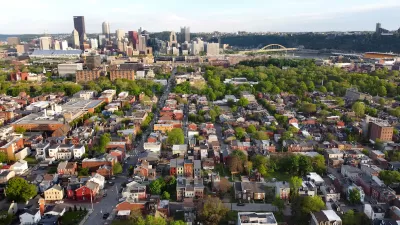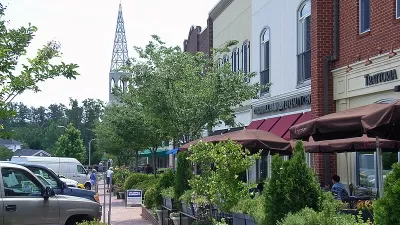Philip Langdon comments on the the economy of oil and its effects on urban design in the July/August issue of New Urban News.
"Approximately 30 years ago, and it might have been even further back than that, I came across a phrase that has stuck in my mind ever since. In an article about an outcome that was not what people had wanted but that turned out to be unavoidable, the author wrote: 'The economics were in earnest.'
We appear to be at that point in the great contest over whether Americans can go on spreading their homes out into the countryside, moving their jobs to dispersed automobile-dependent locations, and placing their shopping along unwalkable and transit-poor commercial strips. We cannot follow that pattern anymore. The economics of oil are in earnest.
Defenders of sprawl - and they have been legion - failed to see what was coming. Sprawl's defenders insisted that no matter how many flaws might be ascribed to dispersed, low-density development, a large number of Americans like it, so it will just keep on growing. James Howard Kunstler was much more prescient. He repeatedly said and wrote, in his thundering cadence, that it doesn't matter if people like it. If you can't afford it any more, the energy-intensive style of life doesn't have a future."
Thanks to The Intrepid Staff
FULL STORY: The economics are in earnest

Maui's Vacation Rental Debate Turns Ugly
Verbal attacks, misinformation campaigns and fistfights plague a high-stakes debate to convert thousands of vacation rentals into long-term housing.

Planetizen Federal Action Tracker
A weekly monitor of how Trump’s orders and actions are impacting planners and planning in America.

San Francisco Suspends Traffic Calming Amidst Record Deaths
Citing “a challenging fiscal landscape,” the city will cease the program on the heels of 42 traffic deaths, including 24 pedestrians.

Defunct Pittsburgh Power Plant to Become Residential Tower
A decommissioned steam heat plant will be redeveloped into almost 100 affordable housing units.

Trump Prompts Restructuring of Transportation Research Board in “Unprecedented Overreach”
The TRB has eliminated more than half of its committees including those focused on climate, equity, and cities.

Amtrak Rolls Out New Orleans to Alabama “Mardi Gras” Train
The new service will operate morning and evening departures between Mobile and New Orleans.
Urban Design for Planners 1: Software Tools
This six-course series explores essential urban design concepts using open source software and equips planners with the tools they need to participate fully in the urban design process.
Planning for Universal Design
Learn the tools for implementing Universal Design in planning regulations.
Heyer Gruel & Associates PA
JM Goldson LLC
Custer County Colorado
City of Camden Redevelopment Agency
City of Astoria
Transportation Research & Education Center (TREC) at Portland State University
Jefferson Parish Government
Camden Redevelopment Agency
City of Claremont





























